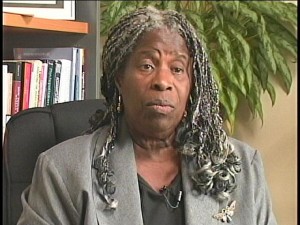Ways to help minor who is traumatized by shooting

Dr. Corinth Morter Lewis
On Wednesday we heard from Amina Shabazz about the effects that last Sunday afternoon’s shooting of nineteen year old Ahmad Nah of Camalote Village is having on her twelve year old daughter. The young students are good friends and he used to visit her family every day. He lies brain dead in the Karl Heusner Memorial Hospital with a five percent chance of survival as a result of a bullet wound to his head. Ahmad was accidentally shot at the child’s home when a toddler tripped and fell over the loaded pellet gun that was leaning against wall in the house. When the twelve year old picked up the gun it accidentally discharged and hit Ahmad at close range in the head. Since then the young girl has been unable to eat and sleep well and has stopped attending classes because she says her friends blame her for the incident. Today News Five’s Marion Ali sat down with Counsellor, Dr. Corinth Morter Lewis of the University of Belize to find out how these types of trauma affect children and how to help her.
Amina Shabazz, Mother of 12 year old (February 24th, 2010)
“Ih noh eat and I ker ah dah hospital and dehn seh if ih continue like dat, ih wah get crazy. Soh anywhere I turn I have to talk to ah and I ker ah everywhere. I noh want lef ah by ihself. I noh send ah dah school because di lee pickni dehn tease ah so I noh send ah.”
Marion Ali
“How does she sleep?”
Amina Shabazz
“Ih noh sleep. I have to give ah sleeping pills and ih still only sleep fi wah hour.”
Marion Ali, Reporting
A twelve year old girl who can’t sleep or eat because of a traumatic experience, is going through a tumultuous period of her life as her close friend clings to life on a ventilator. It is the most trying time for her and as Counselor at the University of Belize, Dr. Corinth Morter Lewis, imparts it will not be an overnight phase. But during that period her family and friends will play a big role.
Dr. Corinth Morter Lewis, Counselor, UB
“Any one of us who go through trauma, even as adults, we know what it feels like, how long it takes us. The child needs somebody to sit with him or sit with her. Sometimes they may not want to talk about it, they feel guilty about it, they feel somehow they are responsible, even though they’re not, and at that stage of development as well. She may be able to communicate what she’s feeling, even in drawings and you give her a story to read and you talk about this story and she could probably express how she’s feeling a lot better that way.”
During this period, Dr. Lewis says the child’s brain has to also process the harsh reality of possibly losing a close friend, coupled with the unfriendly treatment at school.
Dr. Corinth Morter Lewis
“I don’t think the children at school understand it either why they’re behaving the way they are. It’s not that they’re particularly cruel or anything like that. It’s just that they are being young people and what they need is that sensitivity to understand that when these things happen the effect it can have, in this case on their friend. So, like I said, schools have to know when there’s trauma, whether it’s something happening on the school ground, in the classroom, to one of their friends outside who’s there with them how to come together as a group and how to support one another. We have these kinds of sensitivity missing from our schools at times.”
The little girl spoke briefly with News Five on Wednesday when we met her in Belmopan. She had asked her mother to take her to see Ahmad and she told us that she read from a portion of her bible to him and that she held his hand. Dr. Lewis says this is a positive sign of her braving her bout with the trauma and the depression. And every day that passes should help her to understand what has happened.
Dr. Corinth Morter Lewis
“The most important thing is that it will get better. What has happened is an experience that will have some positive results for you later on in your life. You will be able to look back and to understand it in a much more effective way. Right now take all the love you can get from all the people who care about you and know that tomorrow will be a better day.”
Marion Ali for News Five.
The family and friends of persons in such situations are urged to be sensitive to the issue at hand. If the child senses that you are upset, it makes recovery more difficult. When the topic is not brought up, you should not avoid the discussion. Instead lending a listening ear helps a great deal. Having consistent times for meals, homework, and chores also helps to get their lives back on track. But most important is the need to be nurturing, comforting and affectionate.
